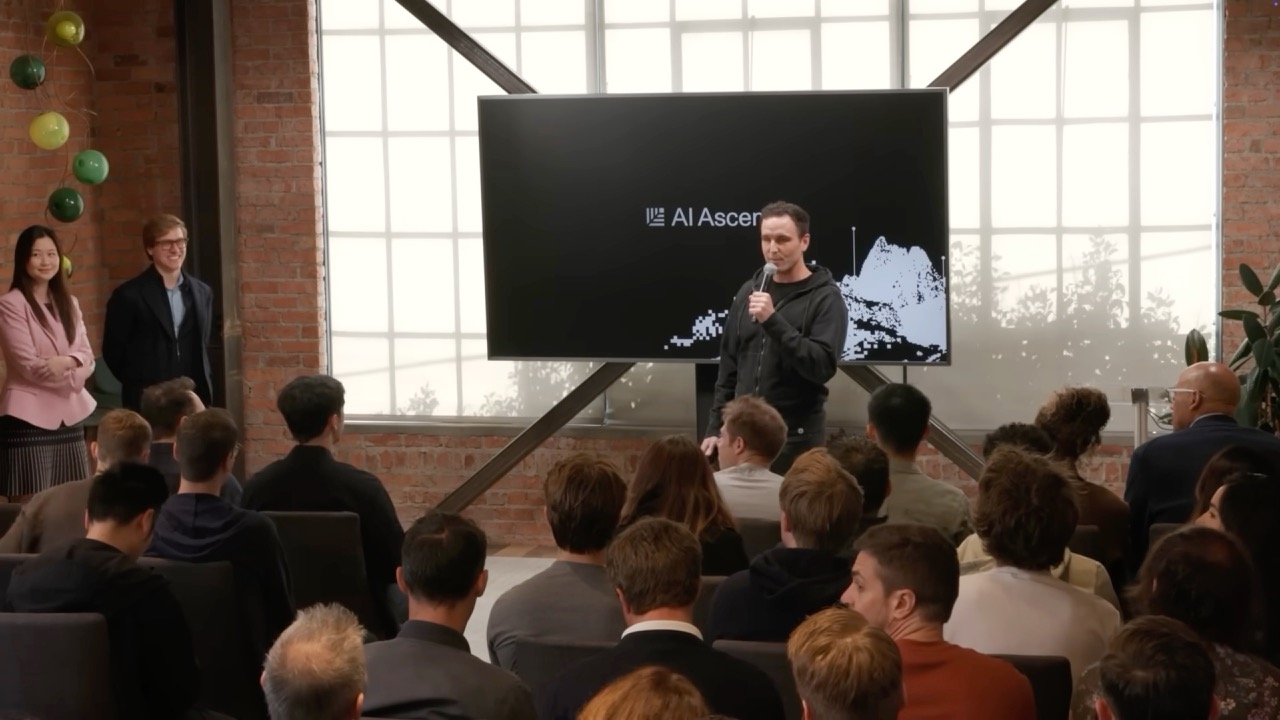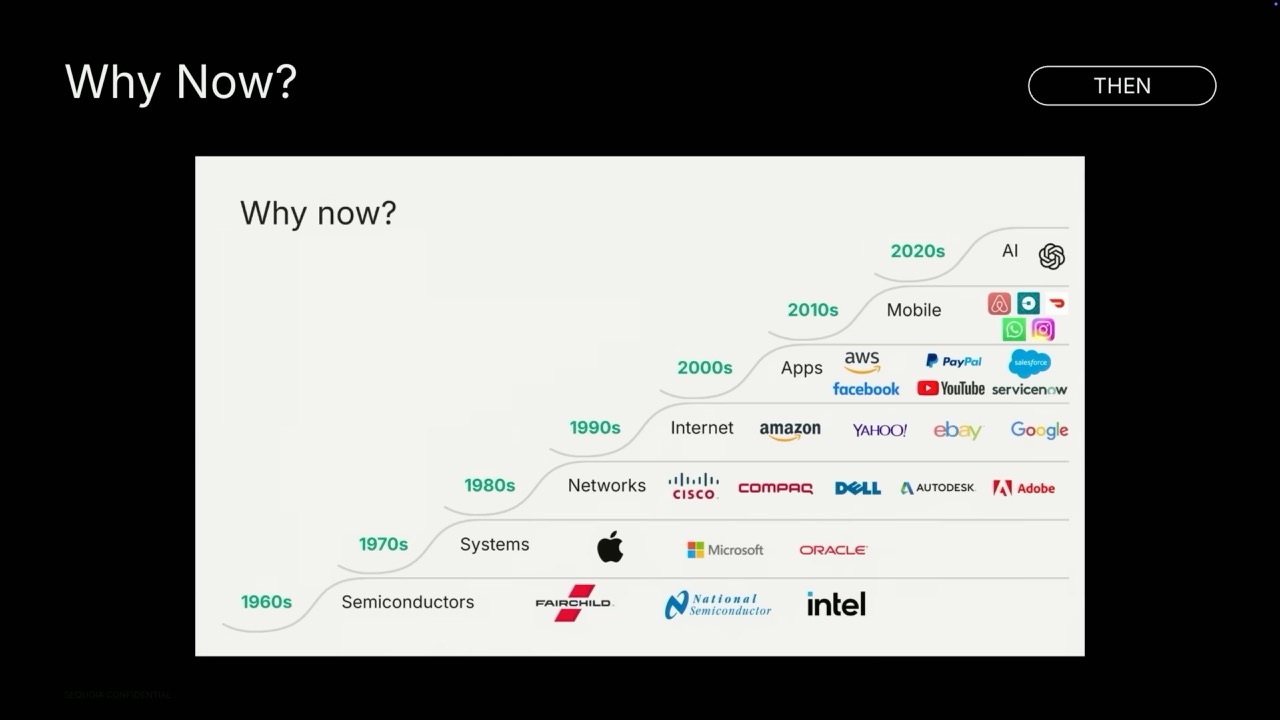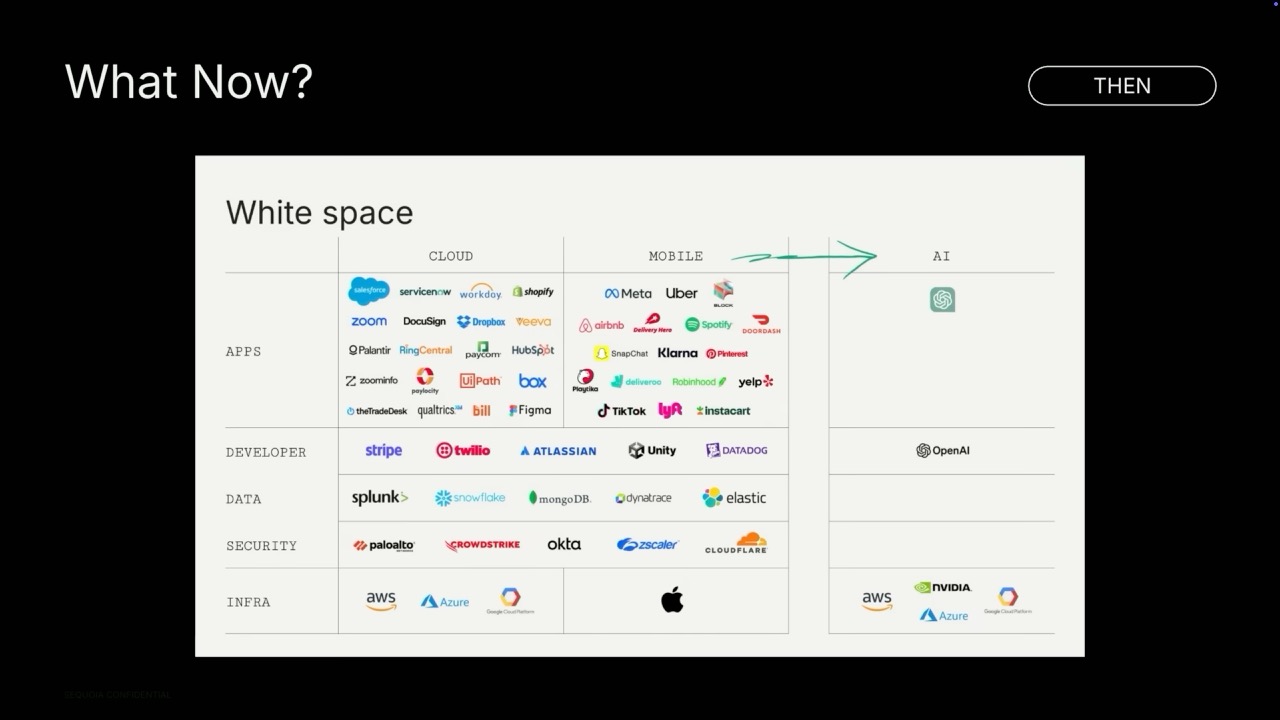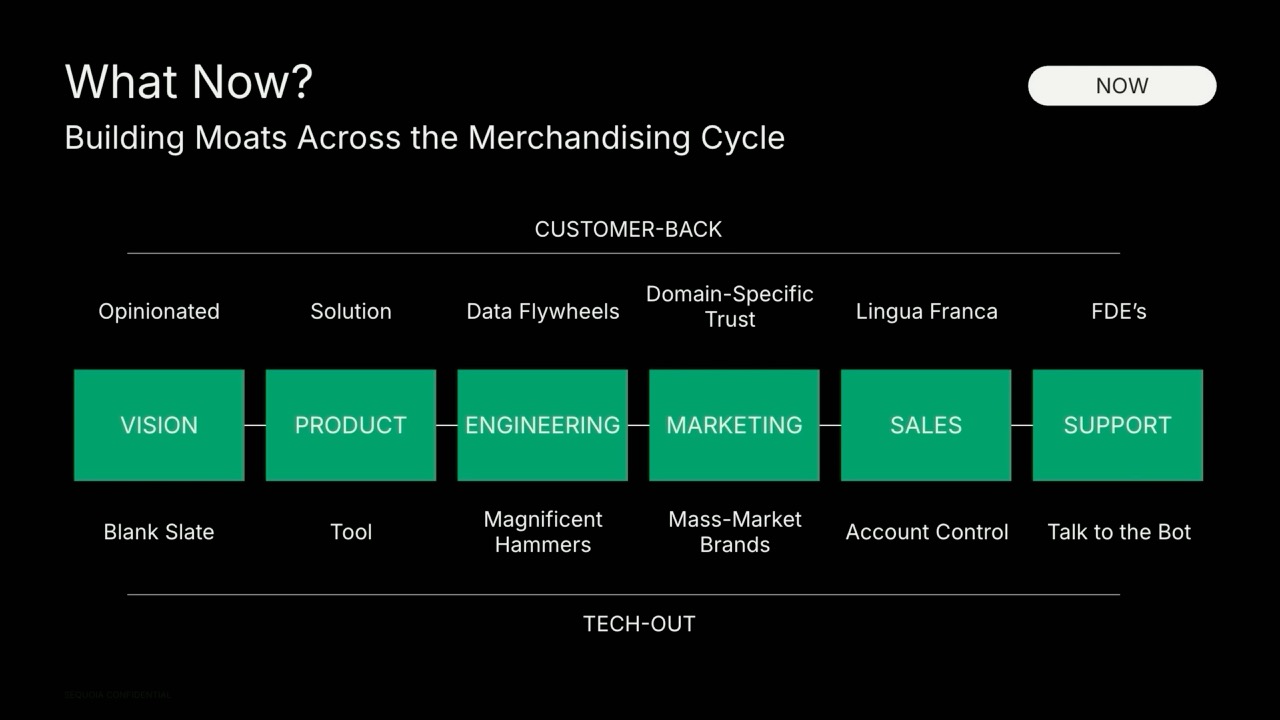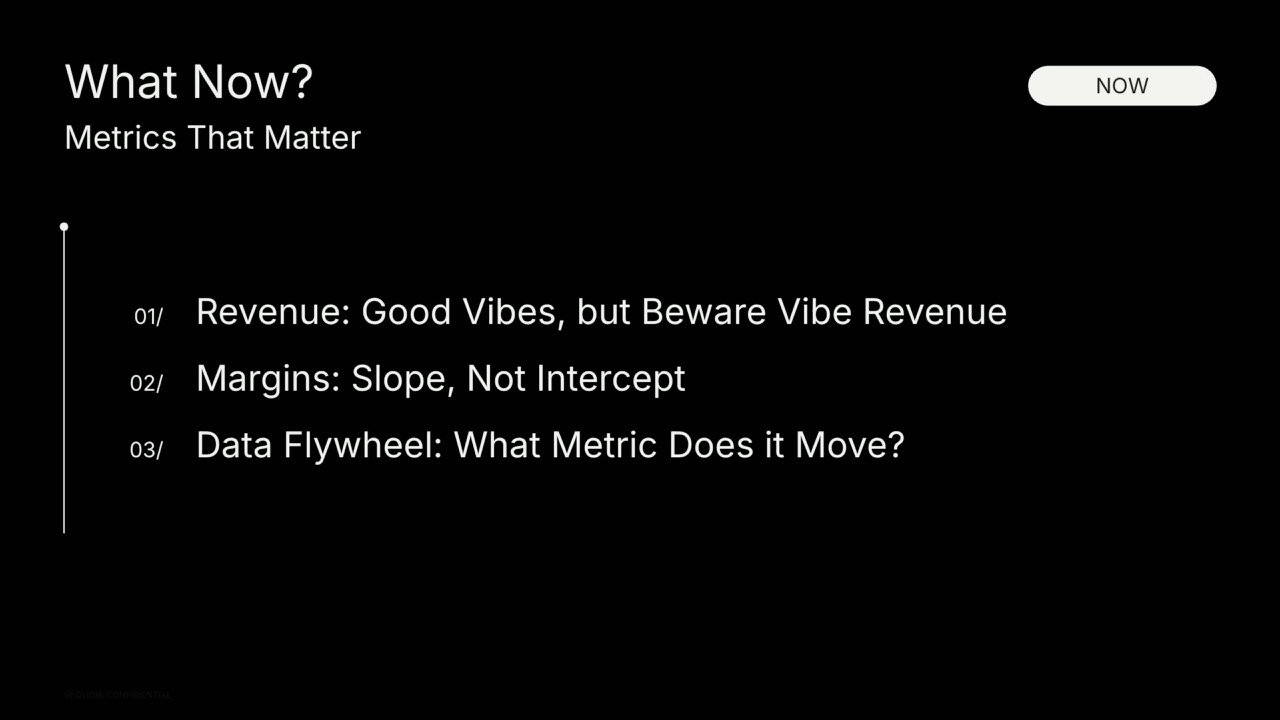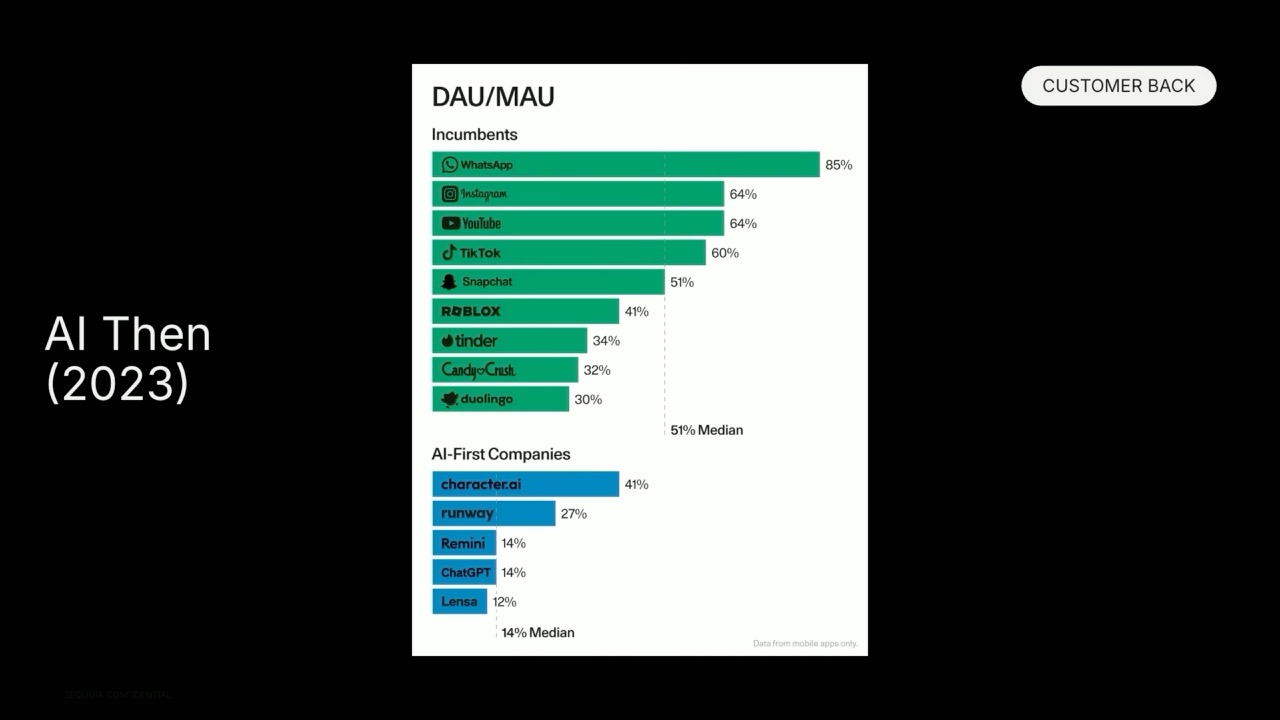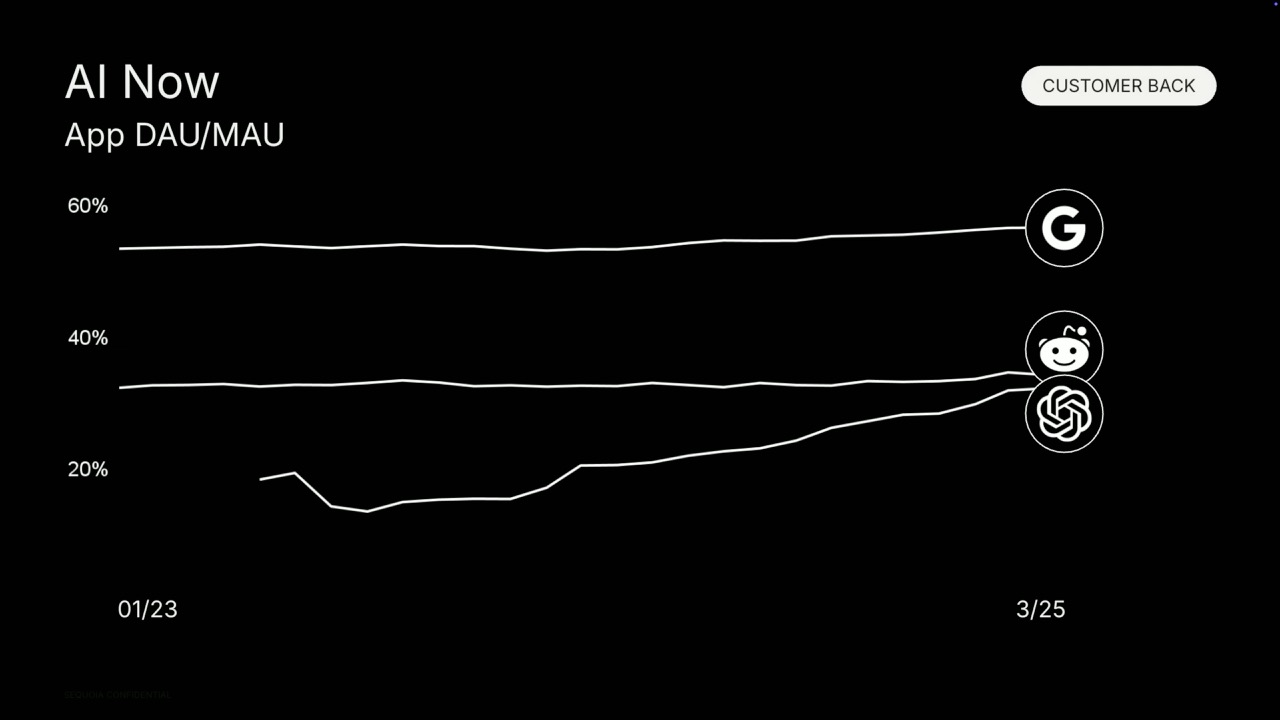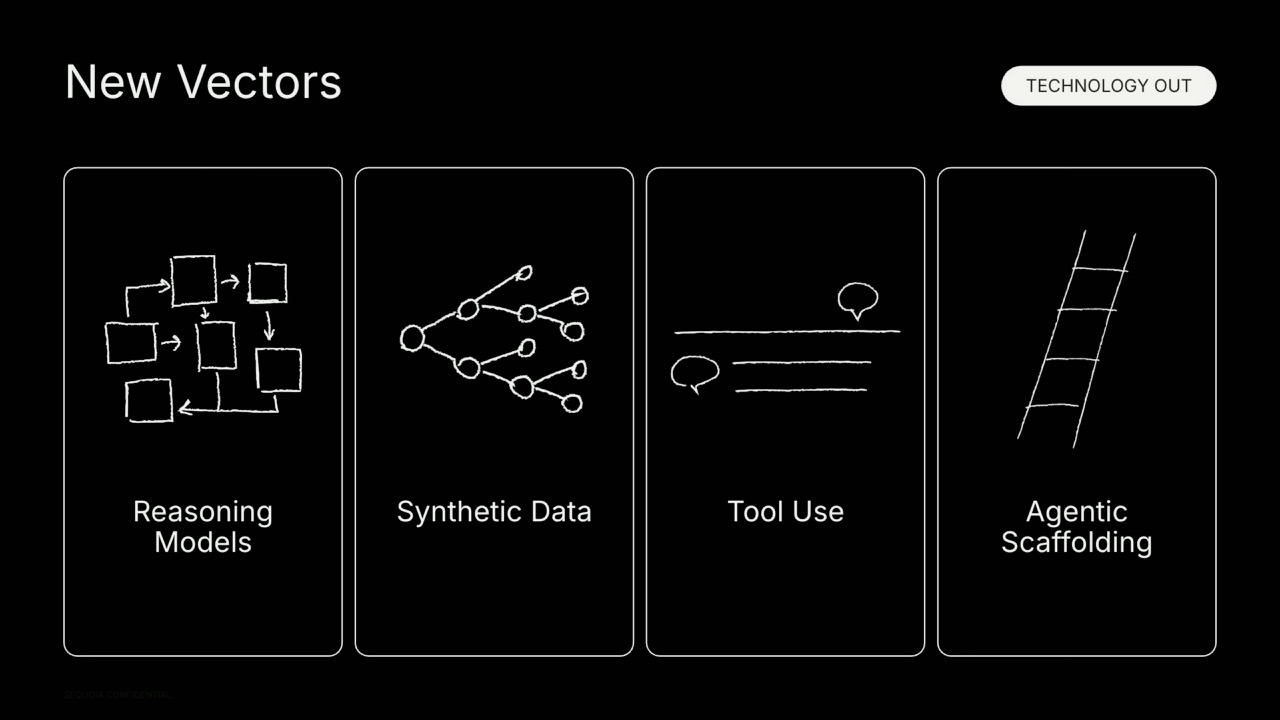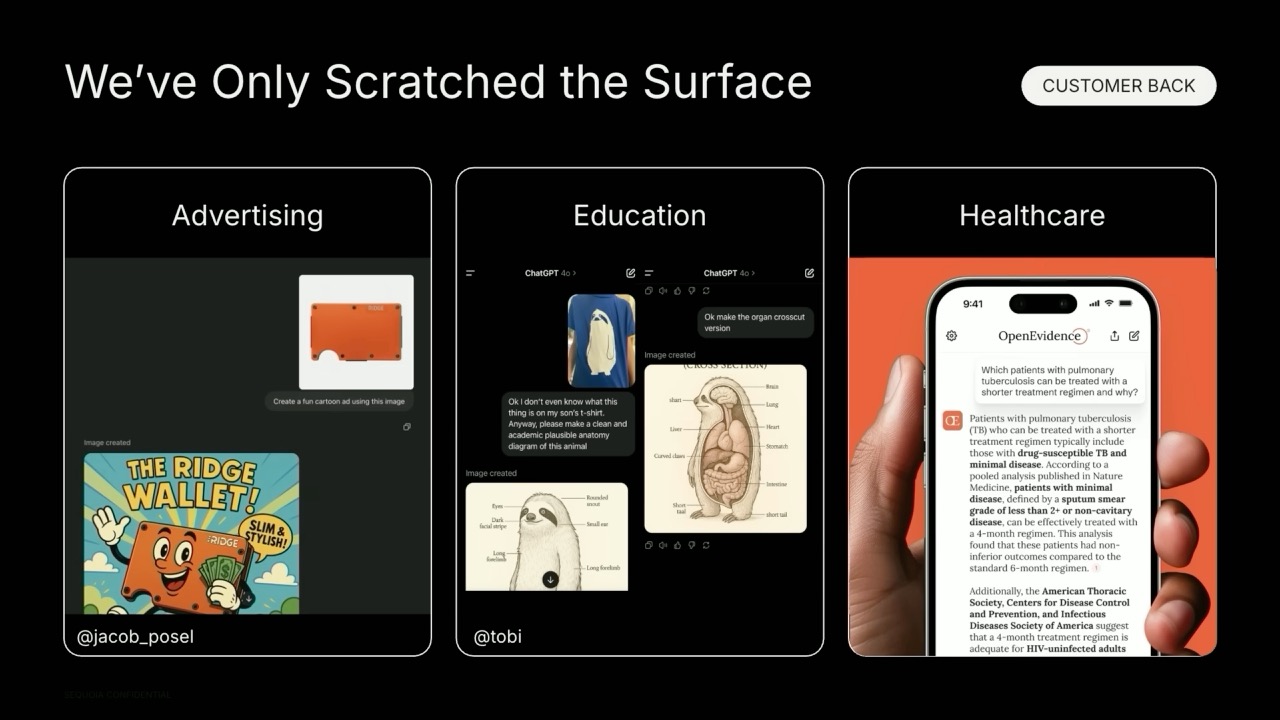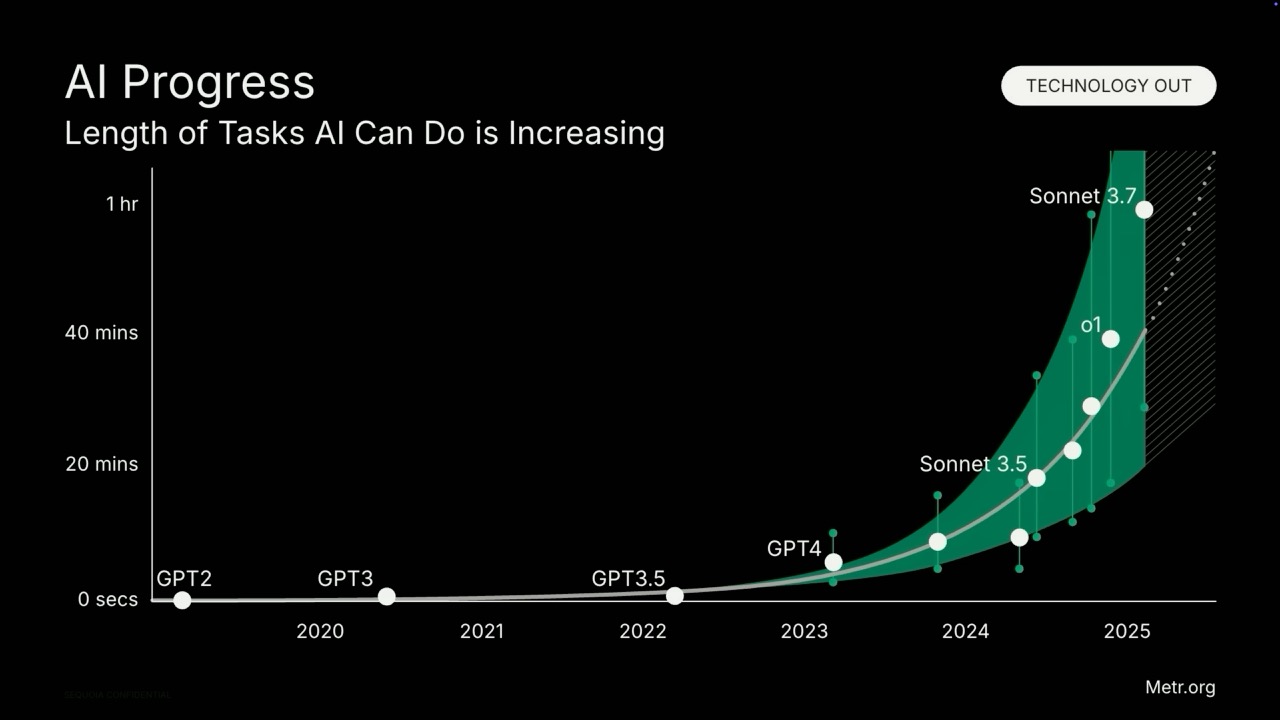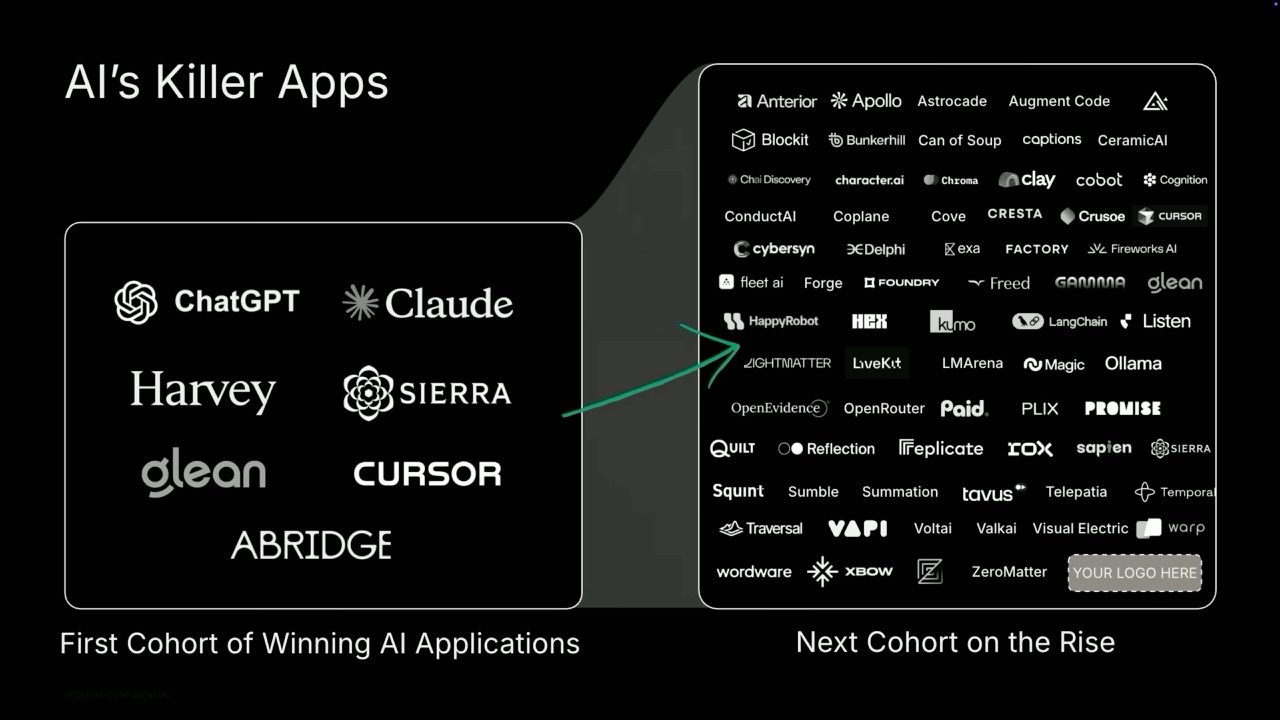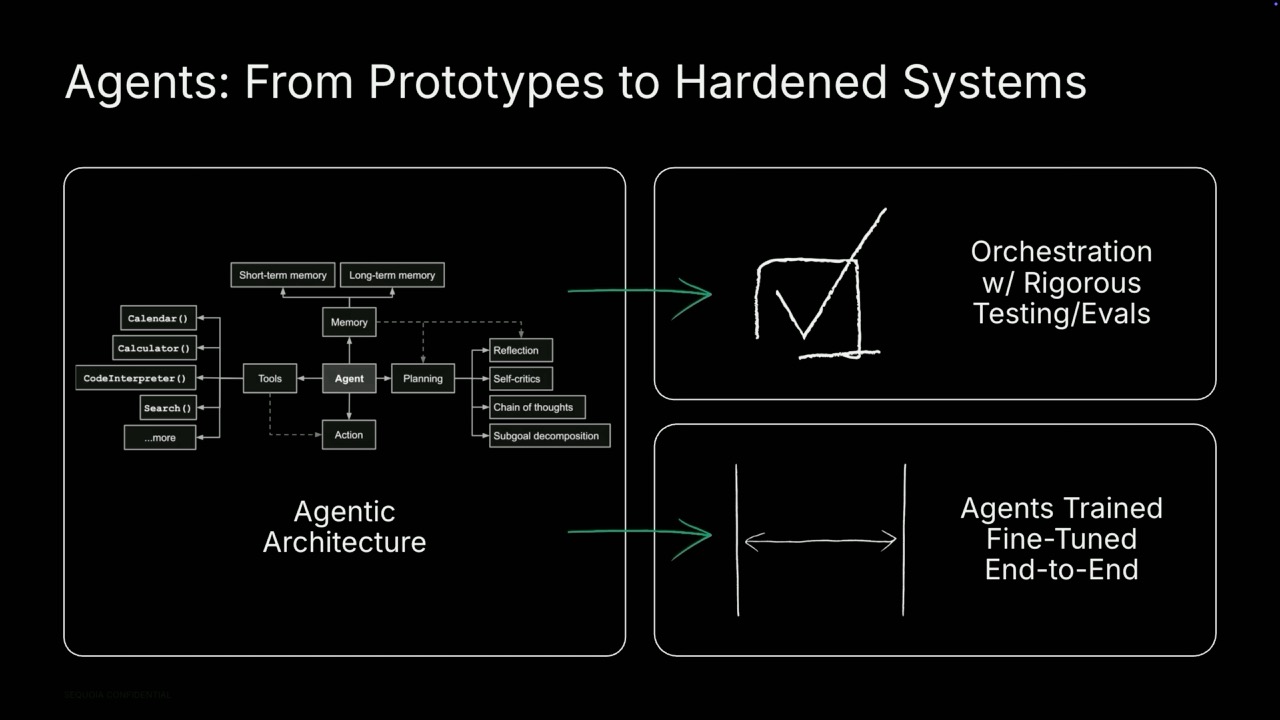AI Summary
At Sequoia Capital's AI Ascent 2025, partners declared AI an economic transformation potentially 10x larger than cloud computing, targeting both software and services markets. They emphasized unprecedented distribution speed enabled by global awareness and connectivity, urging founders to move with "maximum velocity all of the time," focus on the application layer by solving vertical problems, build real revenue beyond "vibe," and prepare for an "agent economy" requiring a "stochastic mindset" to leverage AI's power.
At Sequoia Capital's recent AI Ascent 2025 event, the firm's partners delivered a keynote that outlined their vision for artificial intelligence - not just as a technological revolution, but as an economic transformation that dwarfs previous computing waves. Their message to founders was clear: AI represents a market opportunity at least ten times larger than cloud computing, startups need to move with unprecedented speed, and we're rapidly approaching an "agent economy" where AI systems will work together, creating an entirely new economic paradigm.
The AI Opportunity: 10x Bigger Than Cloud
Sequoia partner Packer Radio set the tone early, presenting a framework that positions AI as targeting a market "at least an order of magnitude bigger" than cloud computing. For perspective, he noted that when the cloud transition began, it was already targeting a $400 billion revenue market - larger than the entire global software market at that time.
But AI's potential is significantly larger because it's attacking two massive profit pools simultaneously: both services and software. Radio explained how AI products often evolve from tools to co-pilots to autonomous systems, progressing "from selling a tool into software budget to selling an outcome to selling work into labor budget."
This dual-market approach means AI's total addressable market could be staggeringly large - potentially reaching into the trillions of dollars over the coming decades.
The Physics of Distribution Have Changed
One of the most compelling arguments from the Sequoia team was how fundamentally different AI's adoption curve is compared to previous technology waves. Radio pointed to three factors that have dramatically changed "the physics of distribution":
- Awareness: When Salesforce pioneered cloud software, founder Marc Benioff had to use guerrilla marketing to get attention. By contrast, when ChatGPT launched in November 2022, "the entire world was paying attention to AI."
- Social distribution: Social platforms with 1.2-1.8 billion users didn't exist during the cloud transition but are now powerful channels for spreading technology.
- Internet penetration: When Salesforce launched, only about 200 million people were connected to the internet. Today, that number is 5.6 billion - "effectively every household and every business in the world."
The result is that AI can spread globally almost instantaneously. "When the starting gun went off, there were no barriers to adoption," Radio explained. "This is not an AI-specific phenomenon. This is the new reality of technology distribution."
The Race for the Application Layer
Sequoia has maintained a consistent view on where the most valuable AI companies will emerge. "Most of them are at the application layer," Radio stated, showing how previous technology transitions created billion-dollar businesses primarily at the application level rather than in infrastructure.
However, the competition is fiercer now, with Radio noting that foundation models like OpenAI's GPT-4 and Anthropic's Claude are increasingly able to reach into the application layer through "reasoning with tool use and inter-agent communication."
For startups not building foundation models, Sequoia's advice was clear: "Go from the customer back. Think vertical-specific. Think function-specific. Deal with complex problems that might require a human in the loop."
Vibe Revenue vs. Real Revenue
Sequoia partner Patricia Liu offered specific guidance on what the firm looks for in AI companies. The first warning was about "vibe revenue" - the early customer enthusiasm that feels like product-market fit but might not translate into sustainable business.
"Vibe revenue can kill you. Everybody loves vibe revenue. Feels so good," Liu cautioned. "Is it tire-kicking, or are you actually creating durable behavior change?" She advised founders to closely inspect adoption, engagement, and retention metrics.
Liu also emphasized two other critical factors: margins and data flywheels. While gross margins might not be impressive initially due to high compute costs, she noted that "cost per token is down 99% in the last 12-18 months," and that well-positioned companies should have "a good path to really healthy gross margins over time."
As for data flywheels, Liu challenged the audience: "Raise your hand if you got a data flywheel... what business metric does that data flywheel move?" The silence that followed made her point - many companies claim to have data advantages that don't actually translate to business outcomes.
"Maximum Velocity All of the Time"
Perhaps the most urgent message came at the end of Radio's section, where he displayed an image of a vacuum cleaner alongside the phrase "Nature hates a vacuum."
"There is a tremendous sucking sound in the market right now for AI," he explained. "All of the macroeconomic stuff, tariffs and interest rate noise, doesn't matter. The rising tide of technology adoption absolutely swamps any of the volatility that you see in the markets. Ignore it."
His conclusion was unambiguous: "You are in a run-like-heck business right now. Now is the time to go at maximum velocity all of the time."
AI Has Finally Crossed the Engagement Threshold
Sequoia partner Sonia Lin presented data showing that AI applications have overcome their initial engagement problems. Comparing the ratio of daily to monthly active users for AI apps versus traditional mobile apps, Lin revealed that ChatGPT's engagement metrics are now approaching Reddit levels.
"It's been stunning to see," Lin remarked. "I think this is extremely good news. It means that more and more of us are getting value out of AI and we're all climbing the ladder together on how to weave AI into our daily lives." Lin also highlighted several breakthrough AI moments from the past year:
- Voice generation has fully "crossed the uncanny valley"
- Coding reached "screaming product-market fit" following the release of Anthropic's Claude 3.5 Sonnet
- Major advances in reasoning capabilities are enabling AI to tackle increasingly sophisticated tasks
From Agents to an "Agent Economy"
The keynote's final section, delivered by Sequoia partner Constantine Stanislavski, looked further into the future, describing what he called "the agent economy."
"A year ago, AI Ascent was all about agents," Stanislavski recalled. "These machine networks are now broadly called agent swarms. They play a role in many of your companies and are beginning to form into a really critical part of the AI stack."
The next evolution, he predicted, will be an economy where AI agents don't just communicate information but transfer resources, make transactions, keep track of each other, understand trust and reliability, and operate within their own economic system - all while working alongside humans.
For this agent economy to emerge, Stanislavski identified three critical technical challenges:
- Persistent identity - Agents need consistent personalities and the ability to remember user interactions
- Seamless communication protocols - Similar to how TCP/IP enabled the internet
- Security - Critical when business interactions don't happen face-to-face
The "Stochastic Mindset"
Perhaps most intriguing was Stanislavski's description of how AI will change our fundamental approach to computing and management. He contrasted the deterministic nature of traditional computing with what he called the "stochastic mindset" required for AI.
"A lot of us fell in love with computer science because it was so deterministic," he noted. "Now, we're entering an era of computing that's going to be stochastic."
This shift means accepting uncertainty while gaining enormous leverage. "We're entering a world where you can do more, but you have to be able to manage that uncertainty and manage risks."
The ultimate result, according to Stanislavski, will be unprecedented business leverage. He predicted we'll see "companies scale faster than ever before with fewer people than ever before," potentially even leading to "the first one-person unicorn."
His final words echoed the transformative potential Sequoia sees in AI: "It's going to reinvent individual work. It's going to rewire companies. And it's going to recreate the economy."
What This Means for Founders
For founders navigating this rapidly evolving landscape, Sequoia's message combines both opportunity and urgency. The firm clearly believes we're witnessing the early stages of a once-in-a-generation shift that could create trillion-dollar markets and fundamentally reorganize how businesses operate. Their advice for startup founders includes:
- Focus on solving specific vertical or functional problems, working backward from customer needs
- Build trust with customers - it's "more important than your product at this point"
- Distinguish between "vibe revenue" and sustainable business metrics
- Create data advantages that directly improve business outcomes
- Move with extreme speed - "maximum velocity all of the time"
- Prepare for the coming agent economy by addressing persistent identity, communication protocols, and security
- Develop a "stochastic mindset" that balances uncertainty with unprecedented leverage
As AI rapidly transforms from an exciting technology into an economic force, the Sequoia partners made it clear they believe we're still in the early innings of this revolution. For those positioned correctly, the opportunity appears limitless.
Recent Posts



